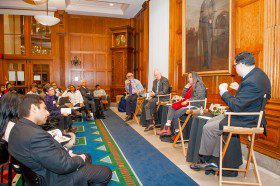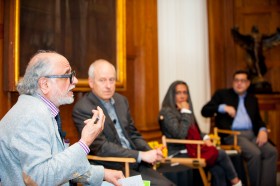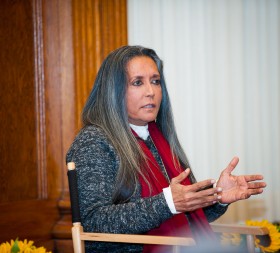This is the third in a series of three recaps of SAI’s Symposium, which took place on May 5 and 6, 2016.
By Shajia Sarfraz, EdM Candidate, Harvard Graduate School of Education; SAI Student Coordinator
Who speaks for democracy in South Asia? Whose voices are encouraged? Whose voices are supported? Whose responsibility is it to aid in the development of democratic dialogue across a country, between different groups and different regions? In a discussion at the South Asia Institute’s Annual Symposium on May 5, moderator Homi Bhabha, Anne F. Rothenberg Professor of English and American Literature and Language, and the Director of the Mahindra Humanities Center at Harvard University, posed these questions to filmmaker Deepa Mehta, Adil Najam, Dean, Frederick S. Pardee School of Global Studies, Boston University, and Michael Sandel, Anne T and Robert M Bass Professor of Government, Harvard University.
Panelists noted that there have been significant technological and communicational developments in the region, and discussed the question of whether there is a digital commons in place and to what extent it aids democratic discourse. Najam, perhaps the most optimistic panelist in the room, responded to the context of Pakistan: “Twitter speaks for democracy in Pakistan.” Although Pakistan is a country where one percent of the population uses Twitter, it is by far the most adequate metaphor for the kind of discourse that is taking place in the country. Najam went on to say that the aforementioned answer to the question of who speaks for democracy in Pakistan might have been the Pakistani drawing room, a “high-class, beautiful room where the elite, who are the masters of destinies of societies, talk and out of it comes a discourse that creates the destinies of nations.” Twitter, however, has opened up an avenue for anger, opinion, and impatience. What we see there is certainly not the most reasoned discourse, he said, but it is emblematic of a discourse, and although the state of the governance in Pakistan is a mess, the discourse of democracy has never been more open.
During her remarks, Mehta was skeptical of the way Indian society has evolved. As a Canadian Indian who represents the arts and culture, she talked about her experience of the outsider/insider dichotomy as it pertains to her work on India. She said that it used to be easy switching between roles of the insider in India and the outsider in Canada. but everything changed with her film Water, which shed light on the plight of widows in India in 1938.
“On the first day of shooting we were surrounded by hordes of people, mostly women, because people felt that the film was anti-national,” Mehta said. “They set fire to our sets. My effigy was being burnt. We did not understand how the film we had gotten permission for suddenly became anti-national, and why suddenly I became a product of the ‘evil west.’” People felt that Mehta had betrayed her culture because, as a woman, Mehta was making films about Hindu widows.
Mehta cited another incident in India from this past December, when a student at a premier liberal arts university in India was arrested on charges of sedition. Mehta lamented that academic and cultural institutions in India are becoming increasingly politicized. This is especially troubling because anytime individuals say something which is different from the popular narrative, they are at risk of being termed “anti-national,” which she herself experienced.
Why is it that citizens have to walk a fine line between being critical or being termed disloyal to their nation? How does one negotiate this climate at a time when the sovereignty of nations seems to have yielded some parts of its autonomy to a global communion? In his remarks, Sandel attempted to diagnose this phenomenon by providing a comparative perspective.
 Recently, in several pluralist and cosmopolitan societies in the world, there have been shifts to similar hard-edged nationalism that can be seen in India. In China, which is not a democracy, there is a similar hardening under the regime of Xi Jinping. There has been increasing control on media as well as a crackdown on NGOs and universities. Turkey, which has been a promising democracy in the past, has seen shifts towards increasing nationalism and authoritarianism. Moreover, the political rhetoric of Donald Trump exhibits the same hard-edged nationalist sentiment.
Recently, in several pluralist and cosmopolitan societies in the world, there have been shifts to similar hard-edged nationalism that can be seen in India. In China, which is not a democracy, there is a similar hardening under the regime of Xi Jinping. There has been increasing control on media as well as a crackdown on NGOs and universities. Turkey, which has been a promising democracy in the past, has seen shifts towards increasing nationalism and authoritarianism. Moreover, the political rhetoric of Donald Trump exhibits the same hard-edged nationalist sentiment.
Sandel attributed this phenomenon to “a revenge of the dislocated souls against the complacence of this market-driven globalization.” The hard-edged nationalist rhetoric which is seen across so many countries finds its political resonance among those who feel economically disempowered and culturally marginalized. It is true of the Trump voters, the constituencies that support the BJP party in India, and the people who support Erdogan in Turkey.
Despite the concerns voiced by the panelists, there was plenty to be optimistic about. Youth and technology are perhaps the two key levers that drive this optimism. Students across the region are hungry for a more engaged discourse. There have been massive social movements that are evidence of that. However, in order to institutionalize these movements, university systems need to be adequately equipped. There is a need to revamp the civic education in order to equip young people to become critically minded citizens. Moreover, leveraging the digital space is another way to institutionalize long standing democratic change instead of having slow, incremental improvement.
WATCH:


